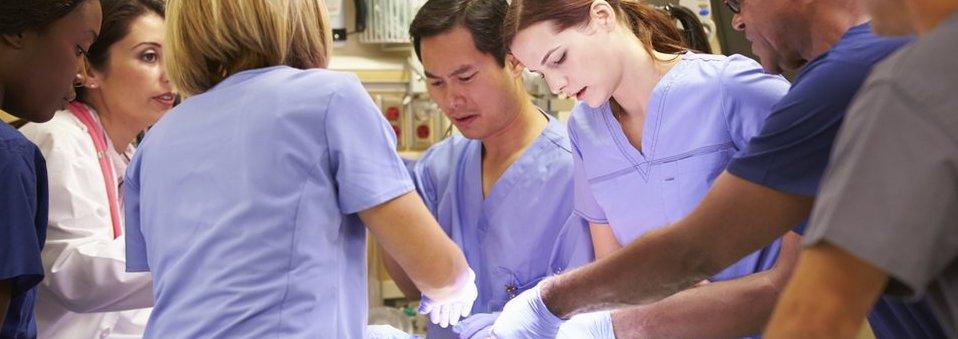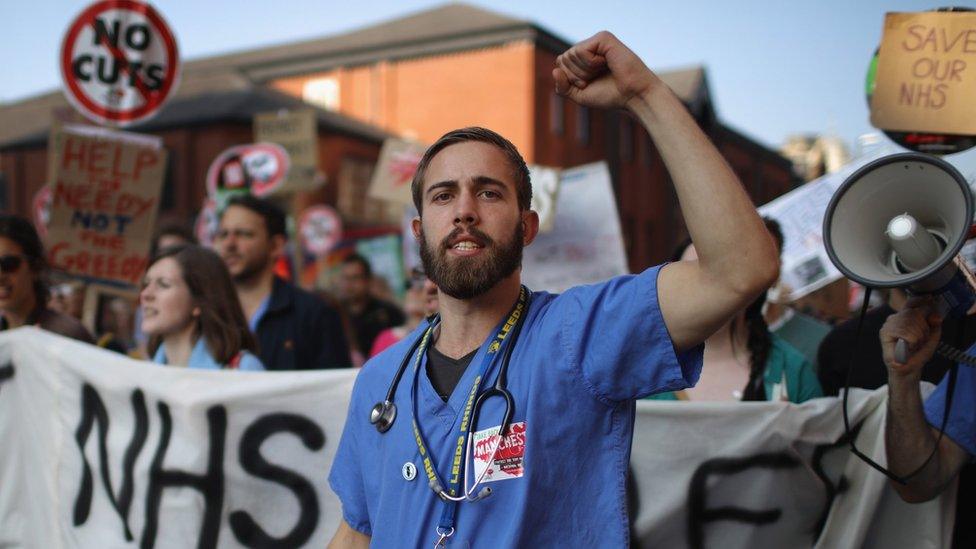Junior doctors to stage A&E walkout
- Published

Junior doctors in England are escalating strike action next month to include a walkout of emergency care.
It will be the first time doctors have refused to provide cover in areas such as A&E and intensive care - the strikes so far have hit routine care.
The British Medical Association said it had been left with "no choice" in its fight against the government's plan to impose a new contract.
The all-out stoppages will take place from 08:00 to 17:00 on 26 and 27 April.
Dr Matt de Martino is a junior doctor at North London Hospital
It will mean consultants will have to be drafted in from across the hospital to staff emergency care, potentially causing lots of disruption to many routine services.
The Department of Health branded the move "desperate and irresponsible" and warned it would harm patients.
There have been three strikes so far in this dispute, but on each occasion junior doctors have staffed emergency care.
This has meant the impact has been limited to the postponing of 19,000 routine operations and treatments - fewer than one in 10 of those planned on those days.
The two all-out strikes now announced replace a 48-hour walkout of non-emergency care planned for those days.
A 48-hour stoppage where emergency cover is to be provided, from 08:00 on 6 April, will go ahead as planned.
Health Secretary Jeremy Hunt: "The only people who will suffer will be patients"

How will this affect patients?

A full walk-out is unchartered territory for hospitals - and of course raises the risk for patients.
Consultants will have to be drafted in from all across the hospital to staff everything from intensive care and emergency surgery to, of course, A&E. That will undoubtedly mean a mass postponement of routine work.
But perhaps more important is what it means for life-threatening care - the heart attack patients and car accident victims. Greater consultant presence in A&E may mean better, quicker care, as they will be more available to make decisions about what patients need.
In emergency surgery, consultants are helped by junior colleagues. Having more consultants in a theatre should resolve that. But where it becomes less clear is what sort of response patients on wards get if they have a medical emergency.
Normally, junior doctors would be among the first medics called. Without them there and with consultants and other staff deployed elsewhere, patients could be vulnerable.

BMA junior doctor leader Dr Johann Malawana said: "No junior doctor wants to take this action, but the government has left us with no choice.
"In refusing to lift imposition and listen to junior doctors' outstanding concerns, the government will bear direct responsibility for the first full walkout of doctors in this country.
"The government is refusing to get back around the table and is ploughing ahead with plans to impose a contract junior doctors have no confidence in and have roundly rejected.
"We want to end this dispute through talks, but the government is making this impossible."
But a Department of Health official said: "This escalation of industrial action is both desperate and irresponsible - and will inevitably put patients in harm's way.
"If the BMA had agreed to negotiate on Saturday pay as they promised to do, we'd have a negotiated agreement by now."
Talks between the government and BMA broke down in January, prompting the government to announce in February it would be imposing the contract from this summer.
Ministers have said the changes, which will see doctors paid less for working weekends, are needed to improve care at weekends. This is disputed by the BMA.
Jeremy Taylor, chief executive of National Voices, a coalition of 160 charities and patient groups, responded by urging ministers to drop plans to impose the contract and for the two sides to get back round the negotiating table.
"The only people who will suffer are patients," he added.
- Published6 April 2016
